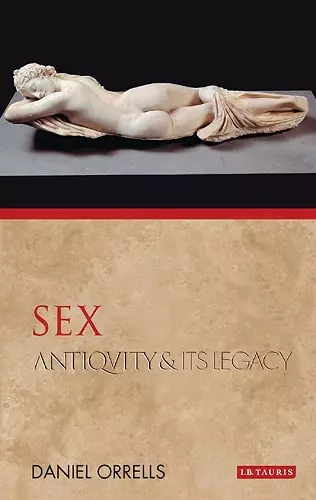Sex
Antiquity and Its Legacy
Format:Hardback
Publisher:Bloomsbury Publishing PLC
Published:30th Apr '15
Should be back in stock very soon

This divertingly readable book explores the contested relationships between ancient and modern ideas about sex and the erotic, encompassing homosexuality, paedophilia, auto-eroticism, cybersex and bestiality. The author shows why the very definition of what sex is has changed radically between ancient and modern times.
Sex is fundamental to society. We cannot think about politics, power, identity or culture without also thinking about sexuality. Despite this, the scientific study of sexual behaviour is a relatively recent phenomenon. Doctors, legal experts and other intellectuals have all pondered challenging questions in an attempt to stay abreast of the latest sexual research. How might we separate talking about sex scientifically from discussing and consuming pornography? How do we speak objectively about desire and pleasure? And how do the words that we use to talk about sex affect what we are able to say about it? Such questions increasingly inform public discourse across a variety of media. Showing how ancient words and ideas have left a significant imprint on present-day ideas about sex, Daniel Orrells offers a bold new narrative of how the scientific study of sexuality came into being. Uncovering the intriguing story of how the obscene and erotic verse of Roman epigram and love poetry became the sanitised language of nineteenth-century sexual science, this divertingly readable book demonstrates how the reception of both Latin and Greek texts was central to the development of modernmsexology and psychoanalysis. Ranging from Sappho, Catullus and Martial to Michel Foucault, Richard von Krafft-Ebing and Sigmund Freud, the author reveals just how profoundly classics has shaped the landscape of sexual identity that we inhabit today.
It may seem that physical sex has no history. (The human race does it, and needs to do it, and has always done it.) But actually there is a real need to consider how the very conceptualization of sex itself has changed, with its different boundaries, constructions and anxieties. Daniel Orrells' intelligent, coherent and intellectually exciting book offers just such a consideration. He takes the somewhat stagnant debate about ancient sexuality in a wholly new and profitable direction, and in so doing gives the field a real shake-up. Orrells is an excellent scholar and writes with wit and verve. In placing the history of the sexual act alongside the ideology of the body, of the person and of agency, his important - but never self-important - book has the potential to break out to a very wide readership.' - Simon Goldhill, Professor of Greek Literature and Culture, University of Cambridge 'This is a spectacular book - learned, provocative, witty, highly readable and tightly argued. Daniel Orrells complicates and complements the arguments of Michel Foucault's History of Sexuality, showing that the sexual lives of the Greeks and Romans, however different from our own, are nonetheless central to modern notions of sexuality, sexual identity, and gender expression. Starting in the Renaissance, Orrells demonstrates that the reception of ancient Greek and Roman literature played a key role in the development of the psychoanalytic understanding of sexuality; that classical scholars, poets, and eventually nineteenth-century sexologists turned to "the classics" for vocabularies and methods of knowing about sex, and of thinking about sex as a form of knowing. This book is immensely informative and delightful to read, presenting complex debates in lucid, playful prose.' - Kirk Ormand, Professor of Classics, Oberlin College, author of Controlling Desires: Sexuality in Ancient Greece and Rome
ISBN: 9781848855199
Dimensions: unknown
Weight: 430g
256 pages